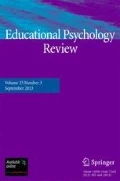Abstract
Parent involvement has a sound research base attesting to the many potential benefits it can offer in education. However, student motivation as an academic outcome of parental involvement has only recently been investigated. The purpose of this article is to show how parent involvement is related to students’ motivation. Studies of students from the elementary school to high school show a beneficial relationship between parental involvement and the following motivational constructs: school engagement, intrinsic/extrinsic motivation, perceived competence, perceived control, self-regulation, mastery goal orientation, and motivation to read. From the synthesis of the parent involvement and motivation literature, we offer potential explanations for their relationship. Directions for areas of continued research are also presented.
Similar content being viewed by others
References
Adunyarittigun, D. (1997). Effects of the Parent Volunteer Program Upon Students’ Self-Perception as a Reader, ERIC Document Reproduction Service No. ED404617, University of Maryland, College Park, MD.
Ames, C., and Archer, J. (1988). Achievement goals in the classroom: Students’ learning strategies and motivation processes. J. Educ. Psychol. 80(3): 260–267.
Ames, C., de Stefano, L., Watkins, T., and Sheldon, S. (1995). Teachers’ School-to-Home Communications and Parent Involvement: The Role of Parent Perceptions and Beliefs (Report No. 28). East Lansing, MI: ERIC Document Service No. ED383451, Center on Families, Communities, Schools, and Children’s Learning, Michigan State University.
Ames, C., Khoju, M., and Watkins, T. (1993). Parent Involvement: The Relationship Between School-to-Home Communication and Parents’ Perceptions and Beliefs (Report No. 15). Urbana, IL: ERIC Document Service No. ED362271, Center on Families, Communities, Schools, and Children’s Learning, Illinois University.
Duda, J. L., and Nicholls, J. G. (1992). Dimensions of achievement motivation in schoolwork and sport. J. Educ. Psychol. 84(3): 290–299.
Dweck, C. S. (1986). Motivational processes affecting learning. Am. Psychol. 41(10): 1040–1048.
Dweck, C. S., and Leggett, E. L. (1988). A social-cognitive approach to motivation and personality. Psychol. Rev. 95(2): 256–273.
Franenkel, J. R., and Wallen, N. E. (2003). How to Design and Evaluate Research in Education, McGraw-Hill, New York.
Ginsburg, G. S., and Bronstein, P. (1993). Family factors related to children’s intrinsic/extrinsic motivational orientation and academic performance. Child Dev. 64: 1461–1474.
Gonzalez, A., Doan Holbein, M., and Quilter, S. (2002). High school students’ goal orientations and their relationship to perceived parenting styles. Contemp. Educ. Psychol. 27: 450–470.
Greenwood, G. E., and Hickman, C. W. (1991). Research and practice in parent involvement: Implications for teacher education. Element. School J. 91(3): 279–288.
Grolnick, W. S., Ryan, R. M., and Deci, E. L. (1991). Inner resources for school achievement: Motivational mediators of children’s perceptions of their parents. J. Educ. Psychol. 83(4): 508–517.
Grolnick, W. S., and Slowiaczek, M. L. (1994). Parents’ involvement in children’s schooling: A multidimensional conceptualization and motivational model. Child Dev. 65: 237–252.
Henderson, A. T., and Berla, N. (1994). A New Generation of Evidence: The Family is Critical to Student Achievement, National Committee for Citizens in Education, Columbia, MD.
Hoover-Dempsey, K. V., and Sandler, H. M. (1997). Why do parents become involved in their children’s education? Rev. Educ. Res. 67(1): 3–42.
Izzo, C. V., Weissberg, R. P., Kasprow, W. J., and Fendrich, M. (1999). A longitudinal assessment of teacher perceptions of parent involvement in children’s education and school performance. Am. J. Community Psychol. 27(6): 817–839.
Keith, T. Z., Reimers, T. M., Fehrmann, P. G., Pottebaum, S. M., and Aubey, L. W. (1986). Parental involvement, homework, and TV time: Direct and indirect effects on high school achievement. J. Educ. Psychol. 78(5): 373–380.
Koskinen, P. S., Blum, I. H., Bisson, S. A., Phillips, S. M., Creamer, T. S., and Baker, T. K. (2000). Book access, shared reading, and audio models: The effects of supporting the literacy learning of linguistically diverse students in school and at home. J. Educ. Psychol. 92(1): 23–36.
Lamborn, S. D., Brown, B. B., Mounts, N. S., and Steinberg, L. (1992). Putting school in perspective: The influence of family, peers, extracurricular participation, and part-time work on academic engagement. In Newmann, F. M. (ed.), Student Engagement and Achievement in American Secondary Schools, Teachers College Press, New York, pp. 153–181.
Marchant, G. J., Paulson, S. E., and Rothlisberg, B. A. (2001). Relations of middle school students’ perceptions of family and school contexts with academic achievement. Psychol. Schools 38(6): 505–519.
No Child Left Behind Act. (2001). Retrieved September 23, 2004, from U.S. Department of Education Web site: http://www.ed.gov/policy/.
Ormrod, J. E. (2000). Educational Psychology: Developing Learners (3rd ed.), Prentice-Hall, Upper Saddle River, NJ.
Paulson, S. E. (1994). Relations of parenting style and parental involvement with ninth-grade students’ achievement. J. Early Adolesc. 14(2): 250–267.
Rumberger, R. W., Ghatak, R., Poulos, G., Ritter, P. L., and Dornbusch, S. M. (1990). Family influences on dropout behavior in one California high school. Sociol. Educ. 63: 283–299.
Steinberg, L., Lamborn, S. D., Dornbusch, S. M., and Darling, N. (1992). Impact of parenting practices on adolescent achievement: Authoritative parenting, school involvement, and encouragement to succeed. Child Dev. 63: 1266–1281.
Stiller, J. D., and Ryan, R. M. (1992, April). Teachers, Parents, and Student Motivation: The Effects of Involvement and Autonomy Support, Paper Presented at the Annual Meeting of the American Educational Research Association, San Francisco, CA.
Stipek, D. (1998). Motivation to Learn: From Theory to Practice, Allyn and Bacon, Needham Heights, MA.
Trusty, J. (1996). Relationship of parental involvement in teens’ career development to teens’ attitudes, perceptions and behavior. J. Res. Dev. Educ. 30(1): 63–69.
Trusty, J., and Lampe, R. E. (1997). Relationship of high-school seniors’ perceptions of parental involvement and control to seniors’ locus of control. J. Couns. Dev. 75(5): 375–384.
Author information
Authors and Affiliations
Corresponding author
Rights and permissions
About this article
Cite this article
Gonzalez-DeHass, A.R., Willems, P.P. & Holbein, M.F.D. Examining the Relationship Between Parental Involvement and Student Motivation. Educ Psychol Rev 17, 99–123 (2005). https://doi.org/10.1007/s10648-005-3949-7
Issue Date:
DOI: https://doi.org/10.1007/s10648-005-3949-7




